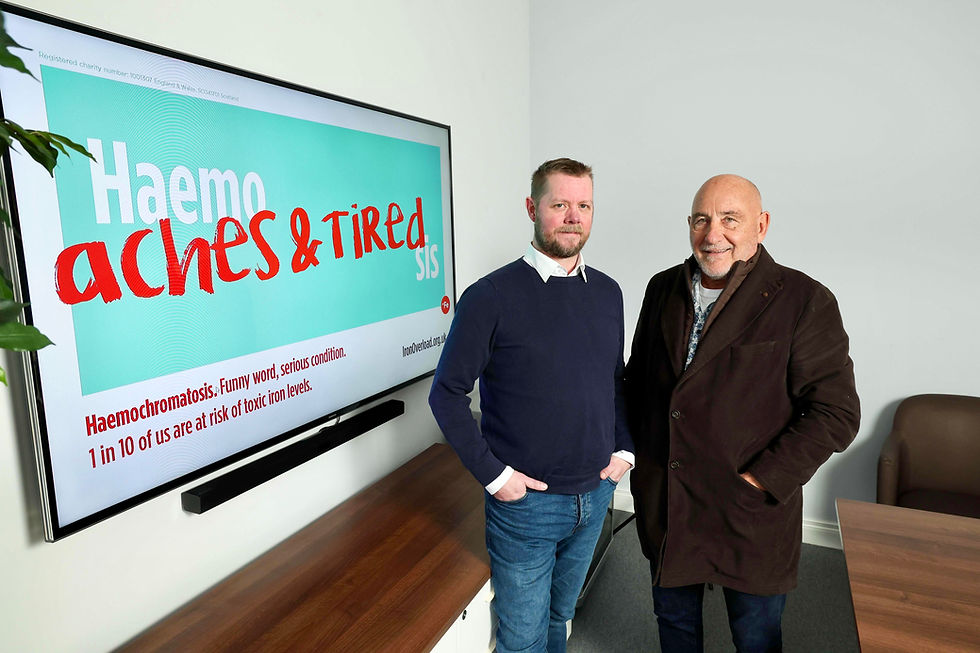Frew labels it “biggest medical scandal in our lifetime” as vaccine-injured & bereaved meet Minister
- Love Ballymena

- May 28, 2025
- 3 min read

Delegation from the Vaccine Injured and Bereaved Support (VIBS) NI, pictured outside Stormont Parliament Buildings
A delegation from the Vaccine Injured and Bereaved Support (VIBS) NI recently met with the Northern Ireland Health Minister, in what MLA Paul Frew described as a hopeful but long-overdue engagement with individuals who, he said, have been “gaslit, ignored and dismissed for far too long.”
The meeting, held at Stormont on Tuesday, 13 May, brought together individuals suffering from injuries and losses they attribute to the COVID-19 vaccine programme.
It marked a significant step in the campaign for recognition and support for those claiming adverse effects from vaccines administered during the pandemic.
Raising the issue in the Northern Ireland Assembly, North Antrim MLA Paul Frew stated:
“I rise to raise awareness of a meeting that took place last week, on Tuesday 13 May, when Vaccine Injured and Bereaved Support (VIBS) NI took a delegation of bereaved and injured people to meet the Health Minister to talk about their conditions, their symptoms and their loss.
“I must say that they got hope from that meeting. I thank the Minister for meeting them and for providing that hope.”
Frew was critical of the way some members of the vaccine-injured community have been treated, claiming they were actively discouraged from seeking recognition within political institutions.
“A Member of the House even told them that they should not meet in Stormont and would be better meeting in a community centre,” he said. “That is how those injured people have been treated to date.”
He called on the Health Minister and medical professionals to openly acknowledge vaccine injuries and offer adequate support.
“I press the Minister to do everything in his power to make sure that those people are, first, recognised — that the medical fraternity recognises them as vaccine-injured, because there is a fear in the medical profession that it dare not talk about vaccine injury — and that those people be given the support that they need to live the rest of their lives in fulfilment despite their injuries and loss.”
Frew’s speech in the Assembly was marked by strong language, expressing concern that this issue could emerge as a defining health scandal of modern times.
“It will be the biggest medical scandal in our lifetime, not because they were injured because they took a medicine — that is the most natural thing in the world — but because they were coerced into taking that medicine by parties in the House and Governments in Westminster and throughout the Western World. Since that and because of that, those people have been ignored. They have been an inconvenience.”
Support groups, led by the charitable organisation VIBS NI, have now been established across Northern Ireland, providing local platforms for vaccine-injured individuals and bereaved families. According to Frew, these groups have grown in reach and are now active in nearly every major town and county.
“Those people need to know that they are not isolated and alone,” Frew continued.
“Those people require that support from the charitable organisation VIBS NI, but they need so much more help from government, the Health Department and trusts. I am determined to make sure that they are recognised and acknowledged and that they receive the support that they so badly need.”
While concerns raised by groups such as VIBS NI deserve careful attention and compassionate response, it is also important to recognise the broader context in which COVID-19 vaccines were developed and deployed.
During the height of the pandemic, vaccines played a pivotal role in reducing severe illness, hospitalisations, and deaths across the UK. According to data from the UK Health Security Agency, the vaccination programme is estimated to have saved tens of thousands of lives and helped prevent the NHS from becoming overwhelmed.
Nonetheless, no medical intervention is without risk. Acknowledging and investigating adverse effects—however rare—is essential to maintaining public trust in health services.
The challenge now, as highlighted in recent discussions at Stormont, is to ensure that those who believe they were harmed are listened to, supported, and treated with dignity, without undermining the overall value of vaccination as a key public health measure. The conversation continues, as both public safety and individual experience must be taken seriously in a democratic and transparent society.








